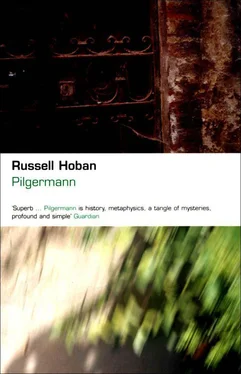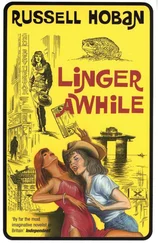Russell Hoban - Pilgermann
Здесь есть возможность читать онлайн «Russell Hoban - Pilgermann» весь текст электронной книги совершенно бесплатно (целиком полную версию без сокращений). В некоторых случаях можно слушать аудио, скачать через торрент в формате fb2 и присутствует краткое содержание. Год выпуска: 2002, Издательство: Bloomsbury Publishing PLC, Жанр: Современная проза, на английском языке. Описание произведения, (предисловие) а так же отзывы посетителей доступны на портале библиотеки ЛибКат.
- Название:Pilgermann
- Автор:
- Издательство:Bloomsbury Publishing PLC
- Жанр:
- Год:2002
- ISBN:нет данных
- Рейтинг книги:5 / 5. Голосов: 1
-
Избранное:Добавить в избранное
- Отзывы:
-
Ваша оценка:
- 100
- 1
- 2
- 3
- 4
- 5
Pilgermann: краткое содержание, описание и аннотация
Предлагаем к чтению аннотацию, описание, краткое содержание или предисловие (зависит от того, что написал сам автор книги «Pilgermann»). Если вы не нашли необходимую информацию о книге — напишите в комментариях, мы постараемся отыскать её.
Pilgermann — читать онлайн бесплатно полную книгу (весь текст) целиком
Ниже представлен текст книги, разбитый по страницам. Система сохранения места последней прочитанной страницы, позволяет с удобством читать онлайн бесплатно книгу «Pilgermann», без необходимости каждый раз заново искать на чём Вы остановились. Поставьте закладку, и сможете в любой момент перейти на страницу, на которой закончили чтение.
Интервал:
Закладка:
Where was I when the Battle of Manzikert was fought in 1071, Anno Mundi 4831 in the Jewish calendar? That was the year of my birth; on some frequency still sounds my birth-cry in the hum and crackle, the roar and whine and whistle where lives the mingled murmur of Romanus and his Jewish executioner. Questions arise continually, everything must be kept in mind at once — at least one must try, must do one’s best. Because everything is with us. Even now the fading heat of the universe’s explosion into being warms the deeps of space, still it fades there, the echo of that first blind bursting shout of beginning. I note that everything that has ever happened is imprinted on me. I can feel it even though I cannot by my own volition recall most of it. With the bursting of the original explosion in me I am again in the year 1096, moving with the many, moving with the thousands towards the fall of Jerusalem, that golden city that I never lived to see. The fall of Jerusalem is at the centre of its space-time; the centre of anything is the centre of everything; how may it be looked at? Could the siege of Jerusalem have been painted by Vermeer? Can such a thing be looked at in such a way? Can the sunlight on mail shirts and blood and severed limbs be looked at as one looks at the daylight from a neat Dutch window in which a quiet woman weighs gold? A better painting to think of is the ‘Head of a Young Girl’: the look that looks out from the face of that young beauty, such asking is there in that look! ‘Are you love? Are you death? Are you the beginning of everything, are you the end?’ Not only does this young girl with her look see all of these but all of these look out at us from her face.
And the look with which Vermeer looked upon her face, that is the look with which everything must be seen; yes, even the severed limbs. Everything that is, everything that happens must be seen with the eye that is in love with seeing. All must be seen with a willing look. From the face of Vermeer’s young girl looks out at us the heart of the mystery, the moving stillness in which again and again explodes, in which even now at this very moment explodes the beginning of all things. From her eyes the unseen looks out at us, and through our eyes looking back into hers also looks the unseen.
This unseen that sometimes we call God, has it a purpose or a destiny? What is its present work? Elephants, whales, mice, cockroaches, humans — from a single cell of any of them can be made the whole creature complete; there is in the cell that reservoir of potentiality. With what we call time the potentiality is unlimited: each moment has in it the matrix of all moments, the possibility of all action. Is it God’s destiny to turn the wheel until every potentiality has become an actuality? For this has God come to hate the world? For this does God weep and curse continually as the wheel turns and there approach him over and over again popes, Jews, warriors, idiots, kings, queens, beggars, lepers, lions, dogs, and monkeys, each busy with its tiny mortal history and each tiny mortal history different from all the others. Even if each one were to try to live out that history exactly the same as the one before it can’t be done; variations and permutations will always come into it.
Will there ever be an end to it all, is the end one of the possibilities? God doesn’t know. God created all the possibilities of variation and permutation but he cannot calculate them. How can this be? Is not God omniscient and omnipotent? Yes, and being so he was able to conceive and create possibilities beyond his understanding and beyond his capability to deal with as agent, as doer. If he were not able to do this he would be less than all-powerful. There is of course a paradox here: if God has not the power to understand everything he is not omniscient, and equally if he has not the power to create something beyond his understanding he is not omnipotent. It is my belief that God is of an artistic temperament and has therefore chosen to let his own work be beyond his understanding; I think this may well be why he has abandoned the He identity and has moved into the It where he is both subject and object, the doer and the done. God is no longer available to receive or transmit personal messages; he has been absorbed into process and toils ignorantly at the wheel with the rest of us.
In this general process some potential actions are actualized, some not. In the channel of action where I moved with the thousands towards Jerusalem there moved also the unlived action of earlier popes who were unsuccessful in their attempts at what is now called a Crusade, Kreuzzug in German. The most direct translation of this word is Cross-pull, and indeed the Cross did exert a pull. Pope Sergius IV in 1011, Leo IX in 1053, Gregory VII in 1074 had tried but had not been able to set these thousands moving towards Jerusalem. Time after time had violent men sharpened the cross into a sword and made their silken vestments into banners; time after time had they spat out the wafer and the wine and shouted for real blood and real bodies. Again and again had this moment tried to come into being; blown out each time like a candle its light sprang up again whenever any flame approached the smoking wick.
Looking at it all from where I am now, looking at faraway events from this great distance I see them as if jumbled together or dancing in a ring, unseparated by time: Crusades, plagues, massacres of Jews, dancing madness, peasant revolts — a dance of life and a dance of death. A dance of life that spins itself into death like gold being spun into straw. Life cannot tolerate itself, life wants to become death. Almost one might say that the function of life is to manifest death. Perhaps death is the gold, life the straw. Death is the natural expression of life. See the swift and fluent dance of maggots in a dead mouse, such a relief, as when a smoking log bursts into flame. And of course it was in my country that the Dancing Madness arose, following hot on the heels of the Black Death which followed on the Crusades.
Because of what happened, because of what was done in the name of Christ, Jerusalem ceased to exist. What remained was not Jerusalem, it was an image fixed on a dead retina. An image retained on the dead retina of an idea. An idea is an eye given by God for the seeing of God. Some of these eyes we cannot bear to look out of, we blind them as quickly as possible.
I must be more precise: Jerusalem has not ceased to exist any more than bread has ceased to exist; the bread that has been eaten is gone, now there is more bread. The Jerusalem that was is gone, now there is more Jerusalem, other Jerusalem. One assumes that the world simply is and is and is but it isn’t, it is like music that we hear a moment at a time and put together in our heads. But this music, unlike other music, cannot be performed again.
With the ear of the mind I hear the army of the Franks on the march, I hear the massed clinking of their tread, I hear the horses snort and whinny, the rattling of leaves of iron. With the eye of the mind I see spokes of sunlight revolving through marching figures, I see the night gleam of armour, I see the Orontes River. As I recall life now I sometimes think of it as a sort of raisin-cake with vast distances between the raisins. As I send the idea of my being questing back it is from raisin to raisin that it makes its way, like the line connecting the dots that make the constellations of the Virgin and the Lion on the star charts. Or the route of the Franks across plains and mountains as they headed, with the harmless migrant storks high above them, for the water-crossing at the Bosporus. The line seeks the image, it smells out the image-making dots as a salmon returning from the sea smells out the river of its birth, swims upstream, spawns and dies. So with the line: it swims upstream, spawns a dot, and dies. The action of the spawning and the death make a dot; what was smelled was the place wanting the dot. Why did the place want a dot, how could a place want a dot, what was the need of the place, whose need? The line’s? The place’s? God’s?
Читать дальшеИнтервал:
Закладка:
Похожие книги на «Pilgermann»
Представляем Вашему вниманию похожие книги на «Pilgermann» списком для выбора. Мы отобрали схожую по названию и смыслу литературу в надежде предоставить читателям больше вариантов отыскать новые, интересные, ещё непрочитанные произведения.
Обсуждение, отзывы о книге «Pilgermann» и просто собственные мнения читателей. Оставьте ваши комментарии, напишите, что Вы думаете о произведении, его смысле или главных героях. Укажите что конкретно понравилось, а что нет, и почему Вы так считаете.












